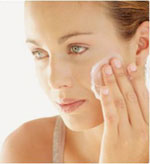Prescription oral acne treatments have a very high risk of toxicity. One example is isotretinoin which goes by names such as: Accutane, Claravis and Sotret. There are many side effects associated with this drug. A few listed by RX List include:
- Seizures
- Dryness of skin
- Hearing or vision problems
- Hallucinations
- Depression
- Thoughts of suicide
The risk of birth defects is of particular concern. And for this reason, the iPledge Program was developed in 2006. According to an FDA mandate, patients, pharmacies and doctors need to register on a website in order to attain this acne medication.
The compliance between doctors and pharmacists was instituted due to the increased number of births ( by hundreds) among women who were taking isotretinoin. The original program that existed was called SMART ( System to Manage Accutane Related Teratogenicity). Many of these women chose abortion due to the defects that affected their unborn children. When interviewed, these patients reported that their doctors downplayed the significance of the regulations at the time
Why Are Pregnancies Still Occurring Among Women Taking Oral Acne Treatment Medication?
Under iPledge, pharmacists have been required to check that the physician had followed through with recommending two forms of birth control, two negative pregnancy tests and provided birth defect risk counseling.
The patients basically pledge to use the contraceptives while on the acne treatment.
JAMA dermatology reported that 122 pregnancies did occur since 2006 when iPledge started. How did this happen?
According to Dr. Eleanor Bimla Schwarz who authored the findings in JAMA, there are no requirements in iPledge which helps educate patients on the most effective forms of contraception. And some of the women reported that their counseling on childbirth prevention was either brief or non-existent.
When Should Accutane Be Taken For Treating Acne?
Due to the hazards associated with prescription oral retinoids, one might assume that that drug should be foregone altogether. Although there are safer options, isotretinoin is a considered a last resort treatment. It is typically reserved only for the most severe cases, such as cystic acne. The drug works by reducing the secretion of oil from the skin.
What Are Safer Forms of Acne Treatment?
The best way to see results from measures against acne is to address the actual causes, which often includes multiple factors.
These issues often occur well below the skin’s surface for many people. And this is why some individuals still have pimples despite rigorous hygiene treatments.
While photodynamic treatments can kill the bacteria which contribute to acne, inflammation and scarring, the Spectra laser is able to address other causal issues. The 1064 nm wavelength will burn away the outer sac around the sebaceous glands. This causes them to secrete less oil. The laser can also destroy bacterial micro-organisms and clear away deeply embedded skin pore blockages.
Treating acne on multiple levels is most likely to produce the best results. Also patients should be aware that laser energy does not stay in the body the way chemicals do. Therefore, a laser treatment for acne is much safer than prescription medication.
To view a video of a Fine Touch Dermatology patient who was treated with the Spectra laser, click here.

